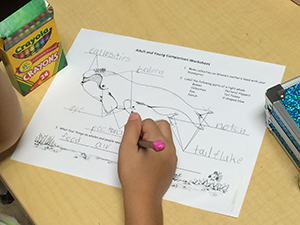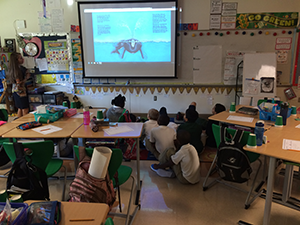Marine Science Curricula
Calling all educators! Bring marine science into your classrooms with these free resources developed by FAU Harbor Branch Oceanographic Institute. Spanning from kindergarten to 12th grade, these lessons have something for everyone and cover marine animals, ecosystems, important research, and STEM careers. Each was created by a team of scientists and educators, and include everything needed to conduct unique, hands-on, and inquiry-based activities. For more information about FAU Harbor Branch’s educational offerings please contact the Ocean Discovery Visitors Center at 772-242-2293.
High School

INVESTIGATING ENVIRONMENTAL CHANGES
Florida is on the frontline of environmental change, and understanding these changes is important for preparing the next generation of scientists, resource managers, and environmental leaders. To bring FAU Harbor Branch research and technology to classrooms across Florida, we have created a curriculum that allows high school students to investigate changes in the environment by using data from the Indian River Lagoon Observatory Network of Environmental Sensors (IRLON). The course includes 5 lessons that cover important science topics and are paired with step-by-step tutorials on how to access, use and interpret water quality data on the interactive website www.irlon.org. These activities teach students to analyze real-world data sets and apply their knowledge to identify a variety of environmental events and stressors. The development of this curricula was supported by the Harbor Branch Oceanographic Institute Foundation and all of the resources have been accredited by the Florida Department of Education.

Science From The Sky
Florida’s connection with the ocean is vital, and as our climate continues to change, so must efforts to educate the next generation of researchers and environmental stewards. To bring FAU Harbor Branch research and expertise to classrooms across Florida, we have created a curriculum that allows high school students to dive into the world of an oceanographer. The course includes 5 lessons that cover important science topics and are paired with step-by-step tutorials on how to access, use and interpret NASA satellite data from an online tool called ‘Giovanni’. These activities teach students to analyze real-world data sets and apply their knowledge at both regional and global scales. The development of this curricula was supported by the Harbor Branch Oceanographic Institute Foundation and all of the resources have been accredited by the Florida Department of Education.

KEEP THE SEA FREE OF DEBRIS
Over five trillion pieces of marine debris reside in oceans around the world, with approximately two trillion pieces originating from the United States alone! Debris can range from microscopic plastics to everyday trash items, abandoned fishing gear and even large vessels. For many people, this issue is out of sight and out of mind, however marine debris continues to harm the environment, wildlife, coastal economies, food security, and more. Although everyone contributes to the marine debris issue, we can also be a part of the solution! Our “Keep the Sea Free of Debris” resources can help educate teenage ambassadors about where marine debris comes from, why it matters, how they can contribute to citizen science, and ways they can advocate for a better world. This informal curriculum bundle is easily adaptable to fit a variety of programming needs and can be implemented during summer camps, science classes, after school activities and more. These resources were created by FAU Harbor Branch Oceanographic Institute scientists and educators through support from the United States Environmental Protection Agency.

An Integrated Approach to Aquaculture
Aquaculture is the farming of aquatic plants and animals for food or restoration. This growing industry plays an important role in producing sustainable seafood and conserving marine resources for generations to come. For decades, FAU Harbor Branch has been a leader in aquaculture, and one of our most exciting technological advancements is the Integrated Multitrophic Aquaculture (or IMTA) system. This high school curriculum was developed by FAU Harbor Branch scientists and educators and can be used to complement a variety of classes including biology, technology, life science, economics and anthropology. Students will learn more about sustainable seafood production and aquaculture system design as well as some of the marine plants and animals that are being cultured. The development of this curricula was supported by the Harbor Branch Oceanographic Institute Foundation.
Middle School

Marine Mammal Mystery
FAU Harbor Branch Oceanographic Institute has been involved in marine mammal research for over 30 years. Our marine mammal rescue team and veterinarian are on-call 24/7 to respond to distressed dolphins and whales that are injured, entangled or stranded throughout Florida. Through this work they learn more about marine mammal health and the wide array of challenges these animals face. This 4th through 6th grade interactive curriculum allows students to become a detective and perform a necropsy simulation based on real scenarios. They’ll use clues to determine why the animal died, discuss how to protect marine mammals, and discover the importance of this work. The development of this curricula was supported by the Harbor Branch Oceanographic Institute Foundation.
Elementary School

HUMPBACK WHALE EDUCATIONAL RESOURCES
From year-round residents to seasonal visitors, there are as many as 12 different whale species that can be found off Florida’s coast. Among them is the humpback whale, which is the most abundant whale in the Atlantic Ocean. Humpback whales have the farthest migration of any mammal and often travel along Florida, with sightings reported from the Treasure Coast. Many Floridians, however, are unaware that these amazing animals share our waters and the need to protect them. Promote awareness of these magnificent marine mammals by sharing our second and fourth grade humpback whale curriculum with your students! Each curriculum bundle features lesson plans, worksheets and activities that were developed by FAU Harbor Branch Oceanographic Institute scientists and educators in partnership with the Florida Department of Education. The development of this curricula was supported by the Harbor Branch Oceanographic Institute Foundation.

Right Whale Educational Resources
With approximately 500 individuals left in the Atlantic Ocean from Canada to Florida, the North Atlantic right whale is among the rarest of the great whales, with threats that include ship strikes and fishing gear entanglements. Our educational resources for first, third and fifth grade students were created to spread understanding and awareness of these magnificent marine mammals through a collaboration between FAU Harbor Branch Oceanographic Institute, FAU Pine Jog Environmental Education Center, and the Marine Resources Council, and with assistance from NOAA Fisheries and the Florida Fish & Wildlife Conservation Commission. Funding was provided through sales of Protect Florida Whales specialty license plates granted through the Harbor Branch Oceanographic Institute Foundation.



